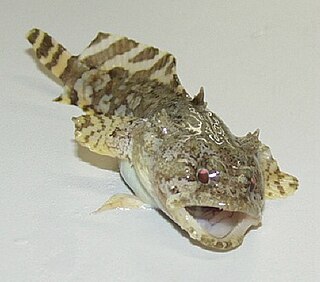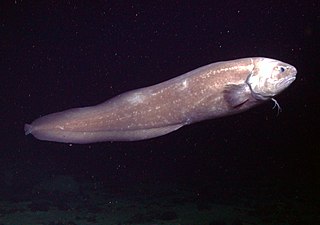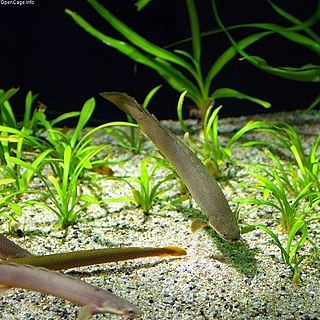Bass is a generic common name shared by many species of ray-finned fish from the large clade Percomorpha, mainly belonging to the orders Perciformes and Moroniformes, encompassing both freshwater and marine species. The word bass comes from Middle English bars, meaning "perch", despite that none of the commonly referred bass species belong to the perch family Percidae.

Pollock or pollack is the common name used for either of the two species of North Atlantic marine fish in the genus Pollachius. Pollachius pollachius is referred to as "pollock" in North America, Ireland and the United Kingdom, while Pollachius virens is usually known as saithe or coley in Great Britain and Ireland. Other names for P. pollachius include the Atlantic pollock, European pollock, lieu jaune, and lythe or lithe; while P. virens is also known as Boston blue, silver bill, or saithe.

The Percidae are a family of ray-finned fish, part of the order Perciformes, which are found in fresh and brackish waters of the Northern Hemisphere. The majority are Nearctic, but there are also Palearctic species. The family contains more than 200 species in 11 genera. The perches and their relatives are in this family; well-known species include the walleye, sauger, ruffe, and three species of perch. However, small fish known as darters are also a part of this family.

Characidae, the characids or characins, is a family of freshwater subtropical and tropical fish belonging to the order Characiformes. The name "characins" is a historical one, but scientists today tend to prefer "characids" to reflect their status as a, by and large, monophyletic group. To arrive there, this family has undergone much systematic and taxonomic change. Among those fishes remaining in the Characidae currently are the tetras, comprising the very similar genera Hemigrammus and Hyphessobrycon, as well as a few related forms, such as the cave and neon tetras. Fish of this family are important as food in several regions, and also constitute a large percentage of captive freshwater aquarium fish species.

Minnow is the common name for a number of species of small freshwater fish, belonging to several genera of the family Cyprinidae and in particular the subfamily Leuciscinae. They are also known in Ireland as pinkeens.

The Squaliformes are an order of sharks that includes about 126 species in seven families.

Carpet sharks are sharks classified in the order Orectolobiformes. Sometimes the common name "carpet shark" is used interchangeably with "wobbegong", which is the common name of sharks in the family Orectolobidae. Carpet sharks have five gill slits, two spineless dorsal fins, and a small mouth that does not extend past the eyes. Many species have barbels.

Batrachoididae is the only family in the ray-finned fish order Batrachoidiformes. Members of this family are usually called toadfish or frogfish: both the English common name and scientific name refer to their toad-like appearance.

Monogeneans, members of the class Monogenea, are a group of ectoparasitic flatworms commonly found on the skin, gills, or fins of fish. They have a direct lifecycle and do not require an intermediate host. Adults are hermaphrodites, meaning they have both male and female reproductive structures.

George Albert Boulenger was a Belgian-British zoologist who described and gave scientific names to over 2,000 new animal species, chiefly fish, reptiles, and amphibians. Boulenger was also an active botanist during the last 30 years of his life, especially in the study of roses.

Sander is a genus of predatory ray-finned fish in the family Percidae, which also includes the perches, ruffes, and darters. They are also known as "pike-perch" because of their resemblance to fish in the unrelated Esocidae (pike) family. They are the only genus in the monotypic tribe Luciopercini, which is one of two tribes in the subfamily Luciopercinae.

The cusk-eel family, Ophidiidae, is a group of marine bony fishes in the Ophidiiformes order. The scientific name is from the Greek ophis meaning "snake", and refers to their eel-like appearance. True eels diverged from other ray-finned fish during the Jurassic, while cusk-eels are part of the Percomorpha clade, along with tuna, perch, seahorses and others.

Pangasius is a genus of medium-large to very large shark catfishes native to fresh water in South and Southeast Asia. The term "pangasius" is sometimes used to specifically refer to the commercially important basa fish, P. bocourti.

Gymnocephalus is a genus of ray-finned fishes from the family Percidae, which includes the perches, pike-perches and darters. They are from the Western Palearctic area, although one species, Gymnocephalus cernua has been accidentally introduced to the Great Lakes region where it is regarded as an invasive species. They have the common name "ruffe" and resemble the true perches in the genus Perca, but are usually smaller and have a different pattern.

Lutjanidae or snappers are a family of perciform fish, mainly marine, but with some members inhabiting estuaries, feeding in fresh water. The family includes about 113 species. Some are important food fish. One of the best known is the red snapper.

An anchovy is a small, common forage fish of the family Engraulidae. Most species are found in marine waters, but several will enter brackish water, and some in South America are restricted to fresh water.

Cladistia is a clade of bony fishes whose only living members are the bichirs of tropical Africa. Their major synapomorphies are a heterocercal tail in which the dorsal fin has independent rays, and a posteriorly elongated parasphenoid.
John Ernest "Jack" Randall was an American ichthyologist and a leading authority on coral reef fishes. Randall described over 800 species and authored 11 books and over 900 scientific papers and popular articles. He spent most of his career working in Hawaii. He died in April 2020 at the age of 95.
Paracrossochilus acerus is a species of freshwater ray-finned fish belonging to the family Cyprinidae, the family which includes the carps, barbs, minnows and related fishes. This species is endemic to northern Borneo where it is found in the Rajang and Baram river systems in Sarawak, the Temburong drainage in Brunei and the Beluran, Kinabatangan and Segama drainages in Sabah, while in Kalimantan it is found in the drainage system of the Kapuas River. This is a bethopelagicspecies that is found in large schools and which has a maximum published standard length of 9.5 cm (3.7 in).

Paracrossochilus vittatus is a species of freshwater ray-finned fish belonging to the family Cyprinidae, the family which includes the carps, barbs, minnows and related fishes. This fish is endemic to the island of Borneo where it occurs in the drainage systems running off its central mountain range including the Kapuas, Mahakam, Barito and Kusan in Kalimantan, the Rajang drainage in Sarawak and the Temburong basin in Brunei. This species is found in fast flowing, clear waters over stony or gravely riverbeds.

















